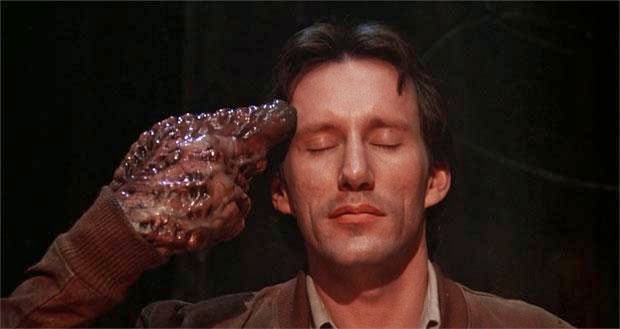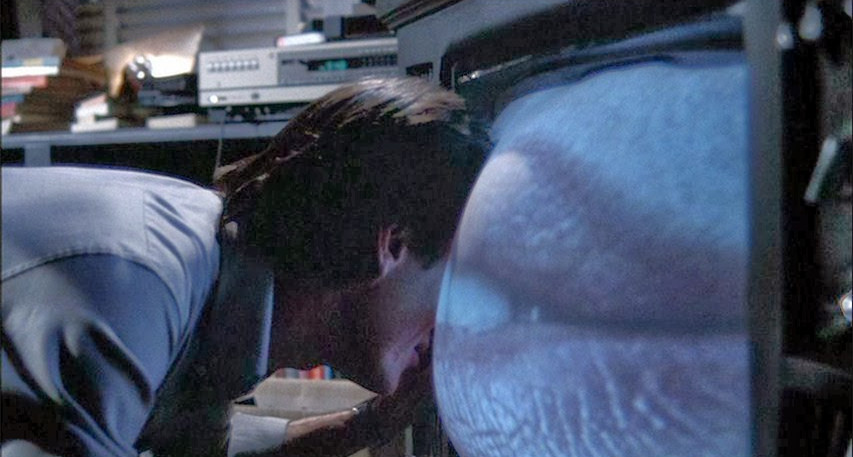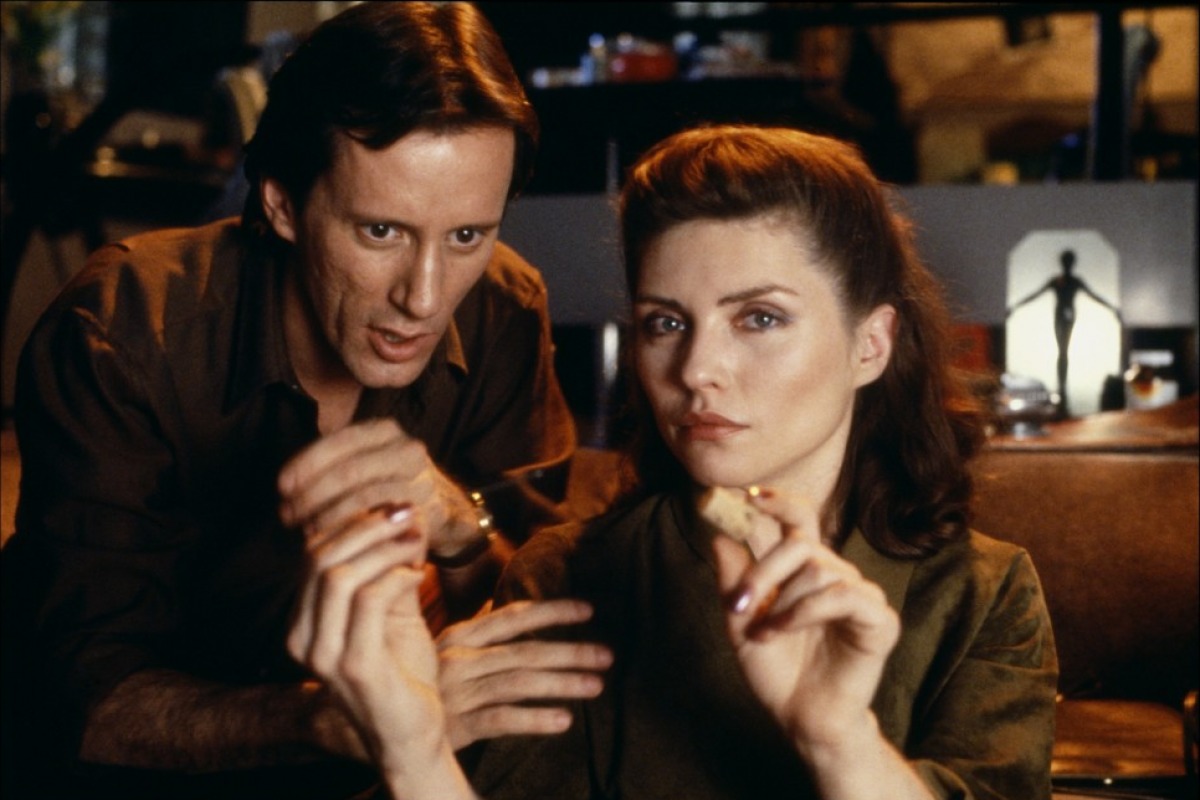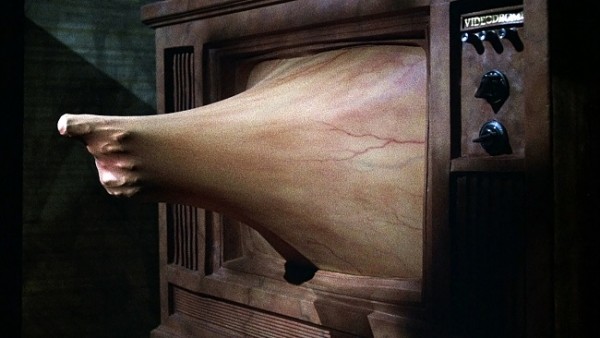
“No one makes movies like [Cronenberg].”
– Martin Scorsese
Long live the new flesh!
Part aphrodisiac and part body horror hallucination, Videodrome is a sensual, shocking, and scary tour de force from Canadian iconoclast David Cronenberg. Embellishing and protracting his persistent interests in viral transference and the body as a collective and biological theater of war, Videodrome is Cronenberg’s most nimbly and skillfully staged encounter of the inducement of terror and the comfort of fantastic philosophy.
Also, for an additional gratuity, Videodrome works as something of an atrocious prophecy of a dystopian future where television, media piracy, pay-per-view violence, video games, prevalent perversion, and torture porn are libertarian undertakings and rule the ratings. Does that sound at all familiar? It’s not all hideous, however, there’s gender fluidity, artistic exemption, and as our anti-hero Max Renn (James Woods, brilliant) reiterates in regards to violence and bloodshed: “Better on TV than on the streets.”
“[Videodrome] is A Clockwork Orange for the Eighties.”
– Andy Warhol
Have you been hallucinating lately?

As a radical and innovative independent venture from Hollywood during the Me Decade, Videodrome’s opportunist tale of terrible transformations elaborated by exposure to trashy television intelligently tackles the complications that Cronenberg experienced with his previous films.
Always an auteur exploring imagery of vicious sexual representation and exploitation cinema, Cronenberg’s earlier efforts such as Shivers (1975), Rabid (1977), and The Brood (1979) all caused Hollywood distributors, censors, and even feminist groups a great deal of aggravation and upset. Videodrome wasn’t very different and it was, initially, pulled prematurely from its theatrical run.
Ostensibly the chronicle of one Max Renn, the president of a trashy Toronto cable-TV channel––Civic TV––he’s an unlikeable opportunist desperate for new and nasty programming to attract audiences.
In his search for big ratings, Max sees potential in a furtive show called “Videodrome,” which seems to be single-minded in its gratuitous torture, plotless and ruthless sexual violence, and brutal punishment, all free of context but, apparently, startlingly authentic. “Snuff TV,” he describes it as, in his search to find the architects behind it, in order to acquire broadcast rights.
Thrown into the mix is Max’s new girlfriend, Nicki Brand (a fearless Deborah Harry), a radio personality/sadomasochistic psychiatrist. Nicki auditions for Videodrome and promptly goes missing, much to the vexation of Max, whose investigation into this eerie program gets more degenerate and desperate.
In the midst of Max’s legwork into Videodrome and the origins of its broadcast signal he grapples with his emotional and mental stability and hideously mutates into a flesh-and-blood VCR in a fucked up fusion of man and machine that epitomizes the classic Cronenberg motif for transmogrification body horror delegation.
“Eroticism is a diabolic pleasure that is related to death and rotting flesh.”
– Luis Buñuel
A scar is what happens when the word is made flesh

Videodrome may well be the most resolute representation and formal embodiment of Cronenberg’s leitmotifs. What begins as an almost atypical mainstream thriller is, by the second act, converted into a subjective nightmare of excessive and unusual compass. Subversive, yes, and transgressive almost to a fault, and the Cronenberg cult, of which I’m a card carrying member, wouldn’t want it any other way.
Luxurious visuals synthesize sublimely with Videodrome’s startling and erudite reflections on polymorphous perversity and, what’s more, the permeation between popular and illusory spheres of experience. It’s really no surprise that Cronenberg has been both extolled and condemned for, amongst other seditious suggestions, providing a shifting and adjustable approach to gender.
Max’s VCR-approximating chest socket looks like a vagina (Rick Baker’s brilliant effects work cannot be downplayed, his work here is viciously sharp). Furthermore, a scene in the film’s third act, removed from the final cut, involves a riposte to Max’s effeminization involving a woman growing a phallus––though Cronenberg had used similar imagery in Shivers and would revisit this spectacle with aplomb in 1991’s Naked Lunch––a shame it was removed from the film, but sadly, not surprising.
“Cronenberg is better than all the rest of us combined.”
– John Carpenter
Kill your television

There’s a certain degree of misanthropy and cynicism in Max’s marketing of sex and violence via Civic TV and when it all backfires in the form of the aforementioned genitalia-like fissure in his abdomen there’s a certain degree of macabre schadenfreude. That and Max seems compelled to stick objects in there.
Audiocassettes, videotapes, even a gun, are inserted into Max’s privy perforation. This transgendering is made all the more fascinating and hermetic when you consider the rather heart-rending self-destruction it climaxes with. It’s startling stuff that subsequently itches at the mind like a surface scar that is too slow to heal.
“You’ll forgive me if I don’t stay around to watch. I just can’t cope with the freaky stuff.”
– Barry Convex (played by Leslie Carlson)
Muscle, bone and ligament twined
For all of its paranoid parenthesis and troubling obiter dictum, Videodrome was too disquieting and quirky to move beyond being a commercial failure, though certainly a critically lauded and artistic consummation. The passing years, like much of Cronenberg’s early oeuvre, have been kind and compensating.
Videodrome is now, accurately, regarded as a classic, and obviously a very idiosyncratic and intimate work for its creator. Cronenberg himself called Videodrome his first-person film and its paternal significance is irrefutable. Audacious and 100% awesome, Videodrome is vintage Cronenberg chronicling societal and psychological collapse with a Bosch-like eye for detail and deranged intelligence. This is the cream of a pitch-dark crop.
Author Bio: Shane Scott-Travis is a film critic, screenwriter, comic book author/illustrator and cineaste. Currently residing in Vancouver, Canada, Shane can often be found at the cinema, the dog park, or off in a corner someplace, paraphrasing Groucho Marx. Follow Shane on Twitter @ShaneScottravis.